第32章
As for children (and it sometimes looks as if the chief products of my garden were small boys and hens), it is admitted that they are barbarians.There is no exception among them to this condition of barbarism.This is not to say that they are not attractive; for they have the virtues as well as the vices of a primitive people.It is held by some naturalists that the child is only a zoophyte, with a stomach, and feelers radiating from it in search of something to fill it.It is true that a child is always hungry all over: but he is also curious all over; and his curiosity is excited about as early as his hunger.He immediately begins to put out his moral feelers into the unknown and the infinite to discover what sort of an existence this is into which he has come.His imagination is quite as hungry as his stomach.And again and again it is stronger than his other appetites.You can easily engage his imagination in a story which will make him forget his dinner.He is credulous and superstitious, and open to all wonder.In this, he is exactly like the savage races.Both gorge themselves on the marvelous; and all the unknown is marvelous to them.I know the general impression is that children must be governed through their stomachs.I think they can be controlled quite as well through their curiosity; that being the more craving and imperious of the two.I have seen children follow about a person who told them stories, and interested them with his charming talk, as greedily as if his pockets had been full of bon-bons.
Perhaps this fact has no practical relation to gardening; but it occurs to me that, if I should paper the outside of my high board fence with the leaves of "The Arabian Nights," it would afford me a good deal of protection,--more, in fact, than spikes in the top, which tear trousers and encourage profanity, but do not save much fruit.A spiked fence is a challenge to any boy of spirit.But if the fence were papered with fairy-tales, would he not stop to read them until it was too late for him to climb into the garden? I don't know.Human nature is vicious.The boy might regard the picture of the garden of the Hesperides only as an advertisement of what was over the fence.I begin to find that the problem of raising fruit is nothing to that of getting it after it has matured.So long as the law, just in many respects, is in force against shooting birds and small boys, the gardener may sow in tears and reap in vain.
The power of a boy is, to me, something fearful.Consider what he can do.You buy and set out a choice pear-tree; you enrich the earth for it; you train and trim it, and vanquish the borer, and watch its slow growth.At length it rewards your care by producing two or three pears, which you cut up and divide in the family, declaring the flavor of the bit you eat to be something extraordinary.The next year, the little tree blossoms full, and sets well; and in the autumn has on its slender, drooping limbs half a bushel of fruit, daily growing more delicious in the sun.You show it to your friends, reading to them the French name, which you can never remember, on the label; and you take an honest pride in the successful fruit of long care.That night your pears shall be required of you by a boy!
Along comes an irresponsible urchin, who has not been growing much longer than the tree, with not twenty-five cents worth of clothing on him, and in five minutes takes off every pear, and retires into safe obscurity.In five minutes the remorseless boy has undone your work of years, and with the easy nonchalance, I doubt not, of any agent of fate, in whose path nothing is sacred or safe.
And it is not of much consequence.The boy goes on his way,--to Congress, or to State Prison: in either place he will be accused of stealing, perhaps wrongfully.You learn, in time, that it is better to have had pears and lost them than not to have had pears at all.
You come to know that the least (and rarest) part of the pleasure of raising fruit is the vulgar eating it.You recall your delight in conversing with the nurseryman, and looking at his illustrated catalogues, where all the pears are drawn perfect in form, and of extra size, and at that exact moment between ripeness and decay which it is so impossible to hit in practice.Fruit cannot be raised on this earth to taste as you imagine those pears would taste.For years you have this pleasure, unalloyed by any disenchanting reality.
How you watch the tender twigs in spring, and the freshly forming bark, hovering about the healthy growing tree with your pruning-knife many a sunny morning! That is happiness.Then, if you know it, you are drinking the very wine of life; and when the sweet juices of the earth mount the limbs, and flow down the tender stem, ripening and reddening the pendent fruit, you feel that you somehow stand at the source of things, and have no unimportant share in the processes of Nature.Enter at this moment boy the destroyer, whose office is that of preserver as well; for, though he removes the fruit from your sight, it remains in your memory immortally ripe and desirable.The gardener needs all these consolations of a high philosophy.